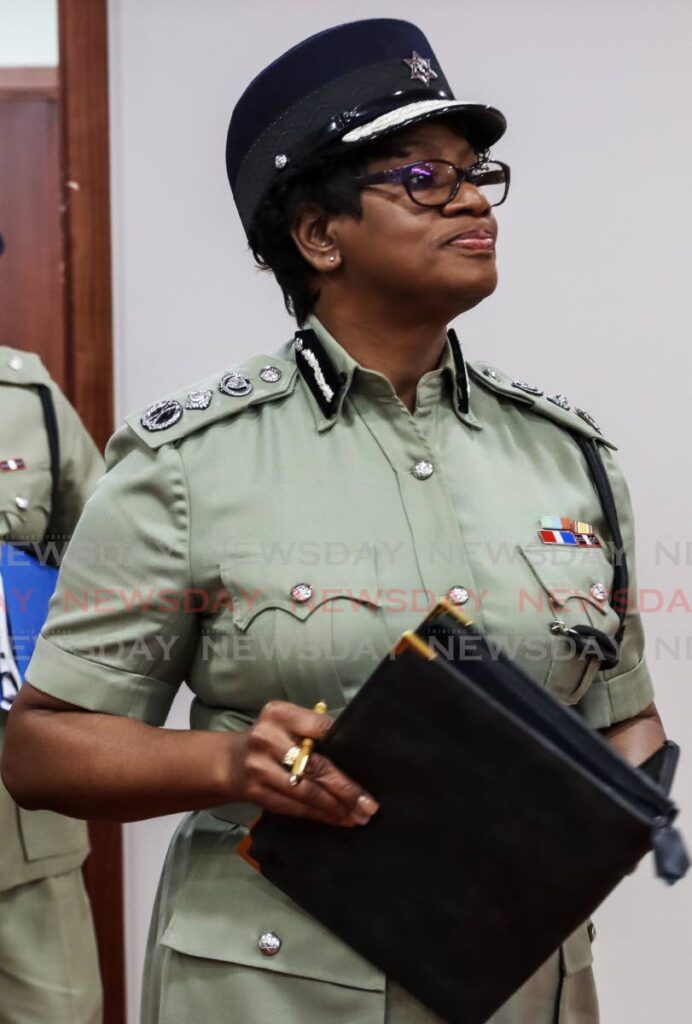Appeal Court: Top cop's one-year extension valid

Police Commissioner Erla Harewood-Christopher’s one-year extension by the Cabinet was constitutionally valid.
On May 8, Appeal Court judges Prakash Moosai, Mark Mohammed, and James Aboud provided an executive summary of the appellate court’s decision on a challenge brought by political and social activist Ravi Balgobin Maharaj after High Court Judge Ricky Rahim dismissed his case in January.
The court’s written decision will be delivered on May 22. The court dismissed Maharaj’s 12 complaints of the judge’s findings.
The judges said because of the urgency of the matter, they chose to deliver a concise summary of their reasons before delivering their written decision.
The court’s ruling was unanimous and all three judges contributed to it.
In the lawsuit, Maharaj challenged the Cabinet’s decision to extend Harewood-Christopher’s term by a year under Section 75 of the Police Service Act before she reached retirement age on May 15, 2023.
The legislation empowers the President to extend the term of a first division officer who is due to retire if it is in the national interest.
Police officers can receive two further one-year extensions based on annual performance reviews. Harewood-Christopher’s assessment has been reportedly completed by the Police Service Commission.
In the ruling, the Appeal Court said a close reading of the law did not reveal any inconsistency.
The judges also held the 2023 extension did not amount to an appointment, as did Rahim in his ruling.
In his ruling on January 16, Rahim held the year-long extension was not unconstitutional and did not trespass on the functions of the PSC.
Harewood-Christopher turned 60 on May 15, 2023, and the extension was from that date to May 14 this year.
Three months earlier, on February 3, 2023, she was appointed this country’s first female top cop.
On May 9, 2023, the National Security Minister announced that the Cabinet had agreed and confirmed the extension of her contract.
In his ruling, Rahim held the extension was not unconstitutional and did not usurp the functions of the PSC.
“Section 75 (a) empowers the President to extend the years of service of a police officer in the first division by one year in the first instance where the President is of the opinion that it is in the national interest so to do.

“There is no exclusion of the office of the CoP from section 75 (a) in that regard, so applying the ordinary, natural and literal meaning to the section, the President is empowered to extend the service of the CoP. Section 75 (b) makes it clear that in respect of officers in the second division, the very same power is vested in the CoP.”
He said when read together with section 123 of the Constitution, it was clear that an annual review must be conducted by the PSC, which must be considered by the Executive when deciding “whether to extend the service of the incumbent after the first year of extended service for another year.”
On this issue, the Appeal Court agreed that the President could extend a period of service by one year in the first instance and thereafter, the office-holder would be subjected to annual reviews for a maximum of two further one-year periods.
“The President was obliged to act on the advice of the Cabinet. The decision as to what was in the national interest is quintessentially an executive function, which Cabinet was best placed to assess.”
The judges further noted that section 75 did not violate the separation of powers doctrine.
Maharaj’s legal team, led by Anand Ramlogan, SC, contended section 75 of the act was inconsistent with section 123 of the Constitution, which gave the PSC the power to recommend the appointment or removal of the Police Commissioner and Deputy Commissioners of Police (DCPs) to be approved by the House of Representatives.
Rahim held there was a difference between appointing a commissioner and extending a commissioner’s term.
“There is, therefore, a marked substantive difference between the appointment of a CoP and the extension of the service of the incumbent and the two are in no way to be understood and treated as the same.
“This, of course, is consistent with the Parliament having retained the power to extend in the Executive so as to keep the qualified, appointed incumbent CoP in service for a limited period so long as the President considers that it is within the national interest so to do,” Rahim said.
According to the State, Cabinet's decision to extend Commissioner Harewood-Christopher's service was based on the fact that she had only been top cop for three and a half months when she reached the age of 60.
It was also submitted that the PSC had taken no disciplinary action against her and the national's interest was a major factor for the police service to have her as the substantive commissioner for more than three and a half months, given the fact that the office had been without a substantive office holder for two years.
Maharaj was also represented by Jayanti Lutchmedial, Kent Samlal, Natasha Bisram, Robert Abdool-Mitchell, and Vishaal Siewsaran.
The Cabinet was represented by Russell Martineau, SC, while Rishi Dass, SC and Vanessa Gopaul represented the AG’s Office.
The PSC was represented by Deborah Peake, SC and Adana Hosang.


Comments
"Appeal Court: Top cop’s one-year extension valid"